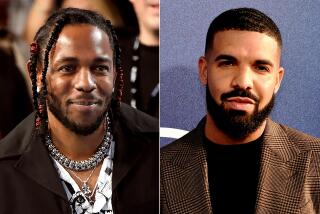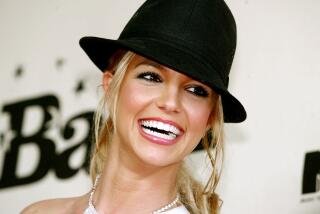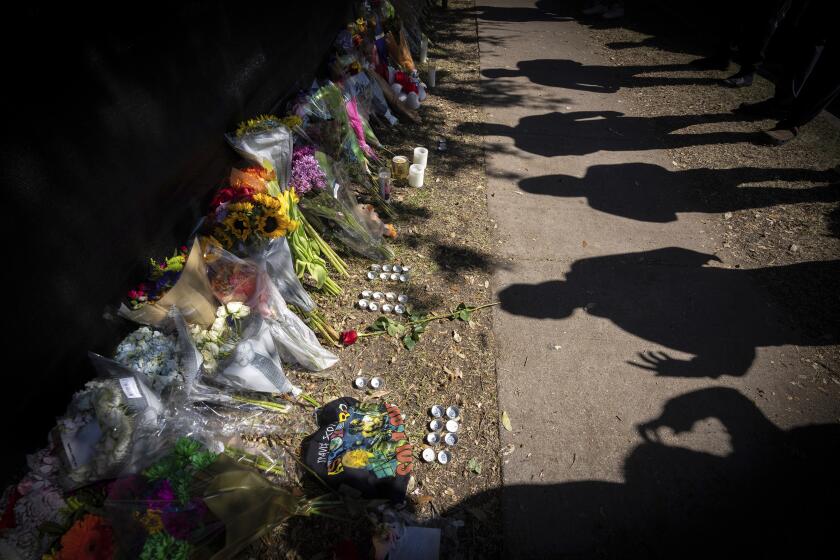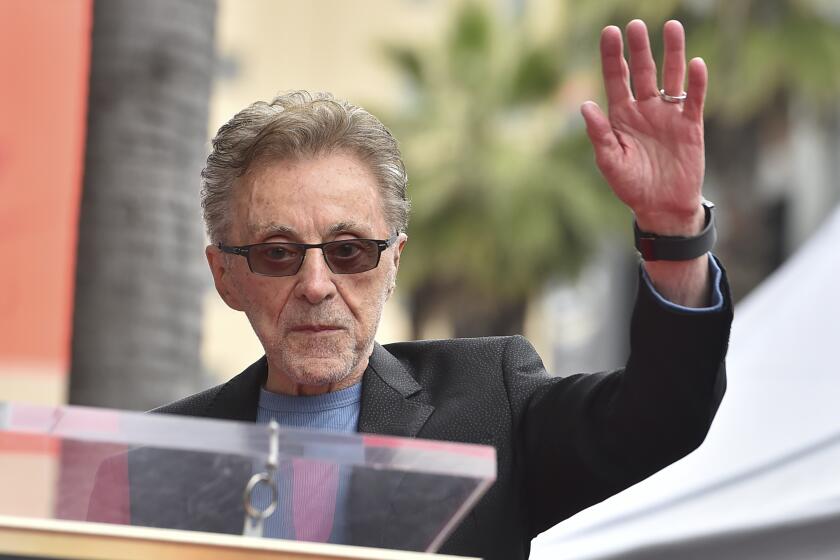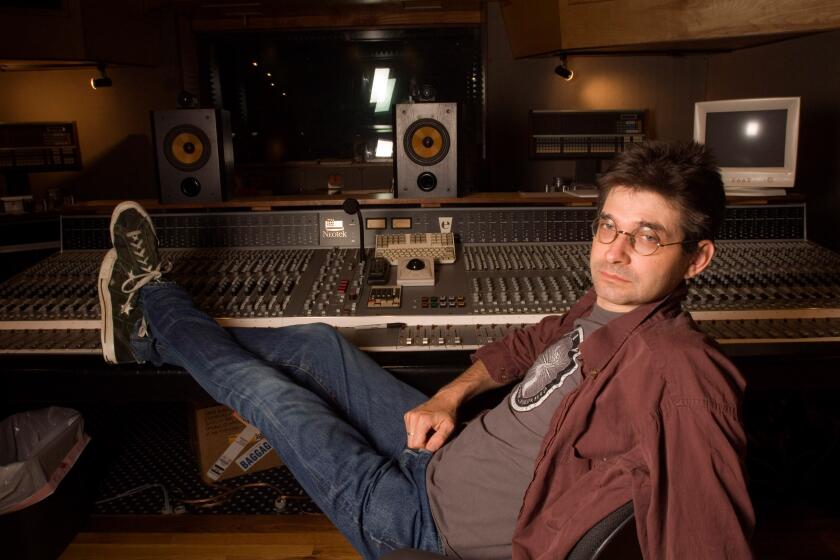This Is Loosened Up
We’ve just infiltrated Mandy Patinkin’s inner sanctum.
At first blush, it looks like any old room, perhaps a converted bedroom, in the sprawling “Hannah and Her Sisters”-like Upper West Side apartment that Patinkin shares with his wife and two teenage sons. But it’s really the set for the ebullient Patinkin’s personal “Tonight Show.”
In one corner stands an upright piano Patinkin can’t play. Against another wall there’s a couch for guests. Sometimes the guests are record executives who come to hear the tenor’s various works in progress. This evening’s lineup consists of Patinkin’s younger son, Gideon, and his buddy David.
Patinkin is about to introduce his first guest, 15-year-old Gideon. Gideon, it turns out, designed the cover of his father’s latest solo album, “Kidults.” Almost.
“I’m going to have to talk about it,” Patinkin says with a glint in his eye, “which is not often allowed.” By Gideon, presumably. But then Patinkin probably has a better grasp of the usefulness of publicity, having mined his share of it during his quarter-century career as a Tony and Emmy award-winning singer and actor.
Patinkin’s sixth solo album--which borrows the late movie critic Vincent Canby’s term for the audience for “Die Hard”--is designed as a palette of songs for the kid in the adult. “And the adult in the kid,” adds the 49-year-old Patinkin. “And for the kid in the kid. And for the adult in the adult.” Which pretty much covers all the bases. Patinkin, who considers himself a storyteller above all, weaves musical narratives by linking songs like “Japanese Sandman” and “Cat’s in the Cradle.” Other selections include “A Tisket, A Tasket,” “Soon It’s Gonna Rain” and “The Minute Waltz.” He’ll sing a few songs from “Kidults” during his eclectic solo concerts Dec. 30 and 31 at the Dorothy Chandler Pavilion, the L.A. leg of a 37-city tour.
Back to the kid. Gideon suggested shooting a CD cover photograph of Patinkin sporting a three-piece suit and sitting in a red Radio Flyer wagon being pulled by a child, who would have appeared alone on the front cover with Patinkin taking up the rear.
“The marketing people insisted that my face, or as they say in Yiddish, punum, be on the cover,” Patinkin says. “So this is the compromise we made.” He displays an inside cover using Gideon’s idea. As he does, the performer beams with pride, or as they say in Yiddish, kvells. “He even got a credit for it,” Patinkin says. Then to the guest on the couch, “That’s your first album credit.”
If you get the idea that all the world’s Patinkin’s stage, you’re probably onto something. He’s a big presence. In person, his hearty laugh seems to rumble up from his intestines before billowing out across the room.
When he’s performing, his passion for passion, for big emotions that threaten to engulf the stage, has earned him detractors and fans, neither side lukewarm about his sometimes over-the-top delivery.
His admirers have included the New Yorker, which has called him “a musical force of nature” who’s “in the business of show stopping.” That’s apparently what Patinkin did on Broadway on Sept. 10, when he kicked off his five-month tour with pianist Paul Ford. The New York Times, which called his voice “gloriously imperfect,” was impressed by his command of the audience, saying: “Judging by the response of the sold-out house, Mr. Patinkin could play New York alone for that long and keep packing the house.”
Indeed, his concerts aren’t kid stuff, despite the possibly misleading title of his new album. “It might even be the most sophisticated concert in terms of musical selections that I’ve done to date,” he says, “because I do the largest amount of Sondheim that I’ve ever done in a concert.” Patinkin is preparing a new all-Stephen Sondheim concert and album that he’ll perform at Washington’s Kennedy Center in June.
For his current tour, he also sings selections from his favorite album, the Yiddish “Mamaloshen,” although each night’s program is different, depending on his mood and that of the audience. But the most notable program changes came immediately after the debut concert. That’s because the next day was Sept. 11.
The burly, Chicago-born performer had planned to finish the concert with an in-your-face plea for Mideast peace. For the final encore, Ford played the Israeli national anthem on piano as if it was a lullaby while Patinkin brought out a black stool with two miniature flags on it. He unfurled them, first the Israeli flag, then the Palestinian flag, and sang the Israeli national anthem. A piano chord was struck and distorted to sound like an explosion. Patinkin knocked over the flags, the lights turned red and he began screaming--”like Hitler on the podium”--the Rodgers & Hammerstein song decrying racism, “You’ve Got to Be Carefully Taught.” Then he finished with a gentle rendition of Sondheim’s “Children Will Listen” under normal lighting.
“Ten hours later, the world changed,” Patinkin says. “The next morning I got a call from an Israeli performer who’d been at the concert and loved what he’d seen, but he hoped I would not be using the Palestinian flag any longer. Had I seen the images on television that morning, the Palestinian children waving the same flag that I’d had onstage, celebrating the World Trade Towers destruction?” Patinkin eliminated the flags, and dropped the red lights and “explosion” because the images of Sept. 11 made it unnecessary to dramatize the conflict onstage.
“If anything, I want those flags together more than ever now,” he says. “I want to see an Israeli and Palestinian state living together side by side. But I don’t want my prayers misunderstood. And I may put the flags back in because as time goes on, everything is changing on the road.”
Patinkin also dropped a few George W. Bush-isms, which suddenly weren’t funny, and began ending the concert on a patriotic note with “Take Me Out to the Ballgame” and “God Bless America” in Yiddish. As he sings the finale, an American flag descends on stage. The first concert with the new ending was in San Diego.
“The minute the flag hit that stage, the entire audience leapt to its feet and started screaming out the words to ‘God Bless America’ in English while I sang in Yiddish, and I quickly realized that they wanted to finish that song.” For a while, Patinkin would speak extemporaneously about his family’s reaction to “that day,” but after six weeks, he stopped. “I’d had enough of reminiscing about what happened, and I wanted to move on,” he says.
The audience, he has noticed, is moving on too. After a while, audiences stopped standing up for “God Bless America.” “James Taylor and I were at Harvard doing a symposium called ‘Sprung From the Ruins,’ where a bunch of artists were talking about what they’re doing now. And we were both talking about being out on the road, and that delicacy and sensitivity to everything, and how the more we forget about it and things just get back to normal, the better it is.”
Patinkin always turns on CNN before he flies out the door to a concert so his comments will be timely. In fact, the immediacy of live concerts makes them his favorite form of performing, even though he’s distinguished himself in other formats: He won a 1996 Emmy for playing heart surgeon Dr. Jeffrey Geiger on the David E. Kelley medical drama “Chicago Hope” and a 1980 Tony for his performance as Che in the Broadway production of “Evita.” He also received a Tony nomination for last year’s “The Wild Party” and one in 1984 for what is arguably his best-known Broadway role--as the title character in Sondheim’s “Sunday in the Park With George.” Patinkin has also appeared in more than 20 films, including “Yentl” (1983) and “The Princess Bride” (1987). And he was cast as theatrical producer Joseph Papp in the biopic “Pinero,” which opened Thursday in New York and Los Angeles.
Not surprisingly, it’s the actor in Patinkin that most enjoys being a soloist. “What interests me most are the lyrics,” he says. “It’s only the words that interest me and the stories that these words tell. It is by coincidence, in my opinion, that they are on musical notes.
“I didn’t grow up with much of this music. It came to me since 1988, when I started working on stuff outside of shows. And the most comforting thing is, this music talks to me. There are wishes, there are prayers and they’re sometimes serious--about how to be a better father, a better person--and sometimes silly--how to get up and dance the hokey pokey in Yiddish, how to make a fool of yourself. All of these songs were written before Sept. 11. But what’s changed is the intensity with which we live our lives, how we listen to the world around us. So it’s like the volume knob is up a little more. One of the questions at the Harvard thing was, Does art change because of the events of Sept. 11? My experience is no. The events that go on in the world change the way we see and hear the world.”
Solo concerts give Patinkin total control, but even though he’s known for being a driven perfectionist, he says concertizing doesn’t feed that impulse. (His mentor Papp once said that Patinkin was “worse than a perfectionist. A perfectionist reaches some degree of satisfaction.”)
On the contrary, Patinkin says he’s used the form to loosen up and experiment. (His 1993 solo album was titled precisely that, “Experiment.”)
His longtime accompanist, Ford, says the concerts can be extremely spontaneous. “Very often, we’ll try out new material on a moment’s notice, big hunks of material. Sometimes he reads the lyrics, sometimes he blows a lyric, and we stop and pick it up again. But we learn so much from the audience when we finally get it out of the studio and onto the stage. Things happen that wouldn’t happen without an audience.”
Indeed, Patinkin says concertizing has almost been a self-help tool. “The solo concert form has taught me to let go of the perfectionistic aspect of my life because in the old days, if I did a song and missed a word, I’d do it over again. Now I don’t care. I’ll throw it out or I’ll make fun of it. I called the first solo concert ‘Dress Casual’ because I was trying to work on that very aspect of my personality which was too controlling, too obsessive, too perfectionistic.”
Patinkin is even intense about relaxing when he’s on the road, preferring to go solo. (He’s married to actress-writer Kathryn Grody, and they also have a 19-year-old son, Isaac.) “I say to the family, ‘Please don’t come out’ because I can’t do anything. I’ve got to stay in a hotel room and sleep. I wake up, I work out, I go back to sleep. I get up, do my yoga, vocalize, eat, go do the show. Then I go back to sleep. I’ve got to get so much rest to be able to get through it because I’m up there alone for two hours.”
Here’s another contradiction about him: Perfectionist though he is, Patinkin doesn’t read music. He says he was too impatient to learn as a child faced with a more accomplished older sister. Now, when he works with pianist Ford, he paints word pictures to describe the music he wants to make. It’s a technique he learned watching Leonard Bernstein teach a student orchestra when Patinkin was studying acting at the Juilliard School. (He later dropped out.)
“It’s usually those first times as we’re working, I’ll say, ‘Make it as though he’s on a carousel and make the carousel spin faster. Can you play it so it’s more dizzy? Can you play it so it’s like water falling?’ He’ll keep doing these different things, and then we get it.” Then he turns to his audience on the couch. “But that,” he says to Gideon, “doesn’t mean you shouldn’t learn how to read music.”
*
“Mandy Patinkin in Concert,” Dorothy Chandler Pavilion, 135 N. Grand Ave., downtown Los Angeles, Dec. 30 at 2 p.m. and Dec. 31 at 8 p.m. Tickets: $15-$75. (213) 365-3500 or www.ticketmaster.com.
*
Irene Lacher is an occasional contributor to Calendar.
More to Read
The biggest entertainment stories
Get our big stories about Hollywood, film, television, music, arts, culture and more right in your inbox as soon as they publish.
You may occasionally receive promotional content from the Los Angeles Times.
